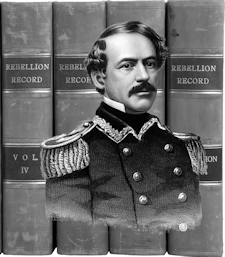January 20.—The Confederate schooner Wilder, from Havana, was captured in Mobile (Ala.) Bay, three miles below Fort Morgan. The schooner, seeing the Union cruiser approach, made for the beach, but had no time to save any thing before the cruiser came within range.
The Unionists lowered their launches, boarded the schooner, lowered the colors, and commenced discharging the cargo into their launches within three hundred yards of the beach. Capt. Ward, of the Wilder, says he had set English colors before he left. As regards the fight, he says that the enemy came up in their launches. Some of Capt. William Cottrill’s scouts met them and fired a few volleys, but did little or no damage. A despatch was sent to the Captain, who came down at about eight o’clock in the evening with reinforcements, and went into the engagement in good earnest, killing about twenty-five or thirty, that is, all that were in one launch, and some others in another launch. The Unionists fired several rounds of shots and shells from the steamer, and also several rounds from the howitzers on the launches and musketry, but not doing the slightest damage to any one on our side. One of the steamers drew off, and her place was filled by another, which also took part in the engagement, but with no effect. At night the steamer came alongside and towed the schooner off. Afterward, Captain Cottrill’s men picked up one of their small-boats which was pierced from stem to stern with bullets.—Mobile Tribune.
— Dr. George Blackball, a surgeon in the rebel navy, died at Norfolk, Va., this day. He was, before his death, in charge of the general hospital at the above place.
—The Secretary of War, at Washington, this day issued the following:
This Department recognizes as the first of its duties to take measures for the relief of the brave men who, having imperilled their lives in the military service of the Government, are now prisoners and captives. It is, therefore, ordered that two Commissioners be appointed to visit the city of Richmond, in Virginia, and wherever else prisoners belonging to the army of the United States may be held, and there take such measures as may be needful, to provide for the wants and contribute to the comfort of such prisoners at the expense of the United States and to such extent as may be permitted by the authorities under whom such prisoners are held.
—The Eighty-first New-York regiment, Colonel Edmund Rose, left Fort Ontario this morning for Albany, en route to the seat of war.
—The Richmond Examiner, of this day, has the following:
The times when the cat-o’-nine-tails was the instrument of naval discipline, and soldiers were strapped to the ground, and their backs mangled with the scourge, have passed, for us at least, into the traditions of another generation. We arc shocked, however, to hear that a navy punishment has been invented in our army which surpasses the horrors of the scourge, and has borrowed its suggestion from the punishments of the Inquisition. It is the thumb torture.
The mode of punishment is to hang the soldier by stramps on the thumb, so that his toes may scarcely touch the ground, and the weight of his body depend from the strained ligaments. We are informed, by testimony that does not admit of question, that this horrid punishment has been practised in a portion of the army on the Potomac, and has been witnessed in the case of two or three men subjected to the torture.



